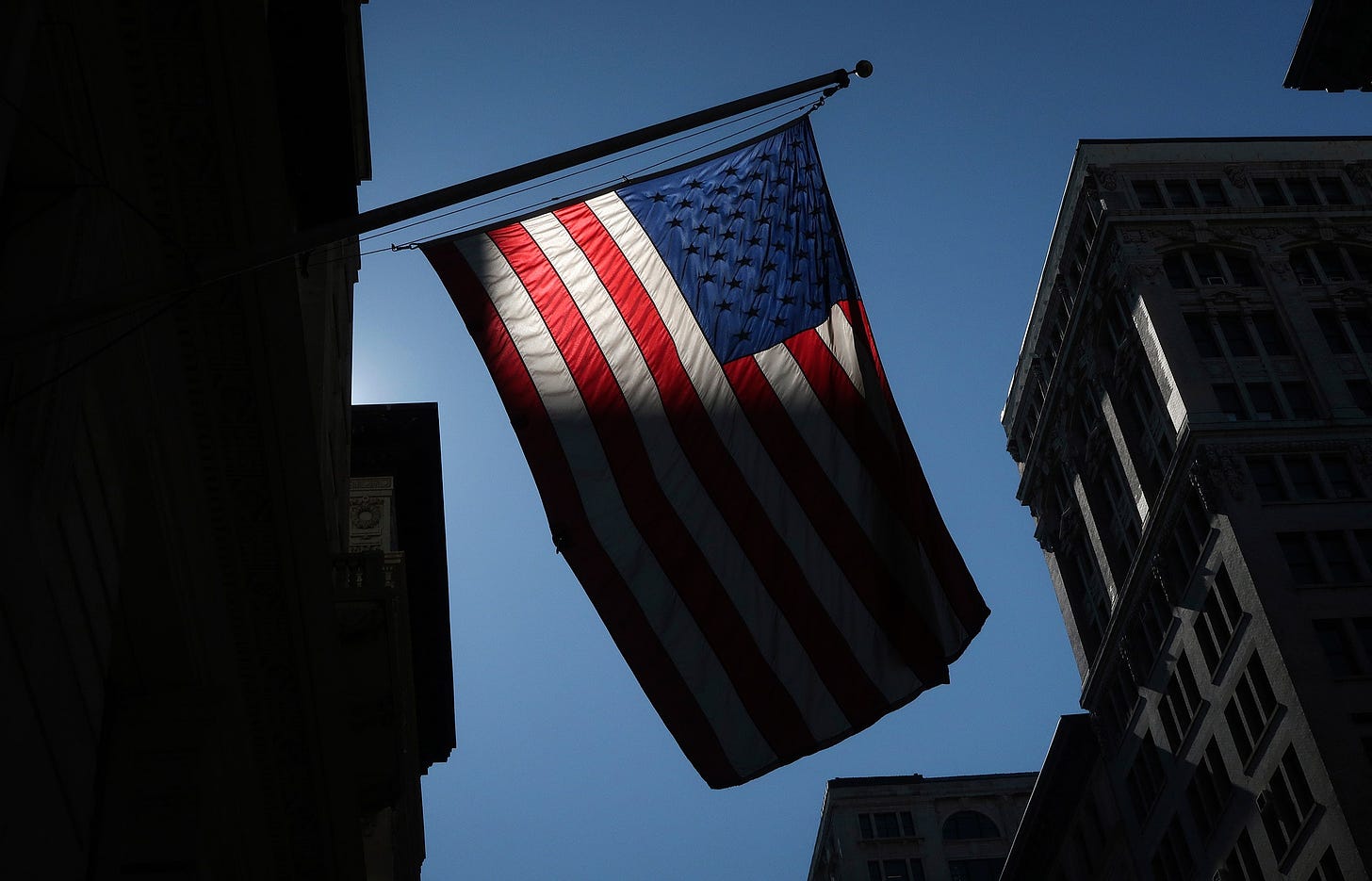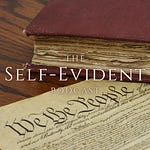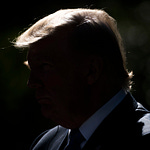Nationalism displaces patriotism’s love for rights and reason, repudiating the victory of civic virtue over the base instincts of tribe and faction.
Welcome to the third episode of the Self-Evident, a podcast about first principles, hosted on Substack along with the Self-Evident Newsletter.
Self-Evident is currently available on Stitcher, Apple Podcasts, and Spotify.
You can also subscribe and get future episodes as well as the newsletter in your inbox:
Episode Transcript
Hello folks, welcome to the third episode of the Self-Evident podcast. There’s been quite a break since my last episode...I’ve had a lot going on in my life. I left my job as a Deputy Sheriff during the summer and began my studies at Utah Valley University and I’ve had a lot on my plate.
For those who don’t know, I’ve put my website, The Liberty Hawk, on hiatus as I focus my efforts on my studies. You’ll still be able to find my writing in my weekly newsletter, now renamed the Self-Evident newsletter, and I’ll also have articles from time to time on NOQ Report, Medium, and at the Federalist Coalition. With more free time, I hope to start having a new podcast episode out every other week. We’ll see how it goes.
Today, I’m going to talk about nationalism. This is something that has a lot to do with our current political moment, both here in America and broadly in the world. Among conservative scholars and intellectuals, there’s been a lot of discussion about whether nationalism is a good thing or a bad thing and whether patriotism is or isn’t a form of nationalism, or, as some claim, if nationalism is patriotism.
What is Nationalism?
The subject of nationalism is quite complicated and it touches on philosophy, sociology, culture, and political ideology. It can be described generally as a process, a movement, and even as related to a subconscious human tendency. But I think the term’s been made to carry too much weight. It’s in desperate need of trimming so that the useful parts can find their place fitfully under the umbrella of other more suiting terms, and the damaging portions can be properly disposed of.
Merriam-Webster’s simple definition of nationalism is “loyalty and devotion to a nation.” It’s more detailed definition explains it as “a sense of national consciousness exalting one nation above all others and placing primary emphasis on promotion of its culture and interest as opposed to those of other nations.”
The online Encyclopedia Britannica adds that nationalism has a “premise that the individual’s loyalty and devotion to the nation-state surpass other individual or group interests.”
The Wikipedia entry for nationalism adds a few more positive aspects by pointing out that nationalism has the “aim of gaining and maintaining the nation’s sovereignty (self-governance)” and it “holds that each nation should govern itself, free from outside interference (self-determination), that a nation is a natural and ideal basis for polity, and that the nation is the only rightful source of political power (popular sovereignty).”
From these general definitions, we have the chief elements that make up the current use of the term nationalism. These can include nationism, tribalism, and patriotism. My argument is that the rise of nations, or nationism, and a national sense of civic virtue, patriotism, should be considered distinctly from the tribalistic tendencies of aggressive nationalism.
The Rise of Nations
The modern idea of a nation is unique because it denotes a far more contiguous connection between government, culture, language, and religion than the traditional notion of the state. Pre-modern ideas of the state were defined by ideas of realms and fealty to a sovereign authority.
For most of human history, political boundaries chiefly followed geographical features, natural lines of defense, or simply the reach of a sovereign entity’s authority. It wasn’t until the enlightenment and the subsequent revolutionary periods in the 18th and 19th centuries that true nations began to form with borders that marked cultural and ethnically homogeneous regions.
The rise of nations, long considered the process of nationalism, is better termed nationism because it was simply something that occurred as a natural response to events. There are no set ideological features linked to the rise of nations and the form of government adopted by these nations was dependent on many other and separate factors.
Using the term nationalism for this process when nationalism is also used to denote distinct political movements and ideas creates a false notion that there is a natural flow from the inevitable rise of nation-states to the notions of political and ideological nationalism. As we can see in the distinct histories of modern nations, there is no such connection.
Nationism involves the idea of sovereign peoples, self-determination by those sovereign peoples, and the nation-state as the legitimate source of political power. We can, and should, regard this as wholly separate from the other traditional aspects of nationalism and we should treat it as a distinct idea.
Nationalism’s Step Backward
While nations were a new turn of events in the 18th Century, the process that led to their creation was basic to the human condition. The primary result of the enlightenment era and the American and French revolutions was a shocking and sudden tearing down of the institutions of monarchy and the idea of the divine right of kings.
While the salutary neglect of the British Crown had conditioned Americans for self-governance, the people of Europe at that time had little to no enduring tradition of governing authority beyond the crown. As wars and revolutions tore down kingships and empires over the next two centuries, nations rose from their ashes, not necessarily in a grand step forward in human progress, but as a regressive move reflecting the primal urges of tribalism.
In other words, the early thrust of nationalism in Europe had nothing to do with the liberalizing ideas of self-governance, self-determination, or popular sovereignty. Instead, it was a reactionary effort to place the old mantle of absolute power and the divine right of kings upon the geopolitical realities that had endured beyond the monarchs: language, culture, and religion.
France rose up against the Ancien Régime, but neither Robespierre’s Reign of Terror nor Napoleon’s French Empire looks like liberal governance. The German nationalism that arose with the abdication of Wilhelm II not only toppled the Weimar Republic but culminated in the conquests and crimes of Nazism. Russian nationalism appropriated Marxism as a vessel for internal purges, regional hegemony, and ideological imperialism.
If nationism is the process that led to the rise of nations, then it is abundantly clear that the process leads to highly varied ends based upon geopolitical realities. The rise and subsequent history of the American nation bears little to no likeness with early European nations. Nations in Europe took steps backward as they indulged in ancient notions of tribalism to justify a renewal of autocratic rule and central authority. The American Republic tempered and offset the negative tendencies of human nature by championing universal ideals. This is what makes America distinct.
An Exceptional Nation
In America, there was no real sense of an American identity among the colonists until the shots rang out at Lexington and Concorde. Even with war at their doorstep, the 2nd Continental Congress had no initial desire to break away from Great Britain. Much of the colonial rhetoric leading up to the American Revolution was predicated upon their perceived rights as Englishmen. Any identity that existed beyond that lay in the markedly distinct cultures, prominent religions, and ethnic backgrounds of each colony.
Even in declaring their independence, the document penned by Thomas Jefferson spoke in a manner unique for the creation of a new nation. He wrote of respecting the opinions of mankind. He asserted a self-evident truth that all men have unalienable rights. He said governments are instituted based on principles. He spoke of the colonist’s identity as a free people. He even mentioned the failure of the common kindred between the American Colonies and their British brethren to overcome their difference in principles.
The United States waged war against the British more as an alliance of sovereign states than as a unified nation. George Washington and his Continental Army were the only true unifying institution during the war. The Continental Congress was infamous for its ineptness. The delegates relied largely on their state governments for support and guidance. State militias often only mustered when British forces entered their own states and remained mostly free from Washington’s direct control.
Even after victory against the British, the unifying ordeal failed to excite centralizing passions. The Articles of Confederation basically maintained the alliance of sovereign states. With no enemy to force mutual efforts, the young nation frankly operated as thirteen independent nations.
Only when faced with the gross failure to govern did the states agree to convene delegates and reform the Articles of Confederation. Only in closed debate did the delegates dare to proceed beyond their mandate and craft a document that would create an entirely new form of government.
And ratification of the Constitution was no easy thing. A vigorous debate ensued. For a time, ratification was far from a sure thing. Only by nature of arguments upon principles, republican ideals, and civic virtue were the states convinced to surrender their autonomy and unite under the US Constitution.
Clearly, there is something unique, distinct, and exceptional about the founding of the American nation. Its history stands apart from the creation of other early-modern nations. So distinct and so exceptional that we need not muddy the idea of American Patriotism by connecting it with European Nationalism.
Patriotism, Nationalism’s Antithesis
So what is American Patriotism? Many scholars consider it to be the American form of civic nationalism. These scholars define civic nationalism as a specific type of nationalism that involves both a national identity as well as certain ideals and values which transcend and inform that identity.
A typical slicing of nationalism calls civic nationalism or patriotism “good nationalism” while calling ethnic nationalism “bad nationalism.” Others posit that patriotism is, in fact, distinct from nationalism but suggest a small, healthy dose of nationalism informs it. My stance is that patriotism, and especially American Patriotism, is a wholly separate idea from nationalism. I am not alone in this notion.
George Orwell said:
“By ‘patriotism’ I mean devotion to a particular place and a particular way of life, which one believes to be the best in the world but has no wish to force upon other people. Patriotism is of its nature defensive, both militarily and culturally. Nationalism, on the other hand, is inseparable from the desire for power. The abiding purpose of every nationalist is to secure more power and more prestige, not for himself but for the nation…in which he has chosen to sink his own individuality.”
William Buckley said:
“I’m as patriotic as anyone from sea to shining sea, but there’s not a molecule of nationalism in me.”
Charles de Gaulle said:
“Patriotism is when love for your own people comes first; nationalism, when hate for people other than your own comes first.”
And Sydney J. Harris said:
“The difference between patriotism and nationalism is that the patriot is proud of his country for what it does, and the nationalist is proud of his country no matter what it does; the first attitude creates a feeling of responsibility, but the second a feeling of blind arrogance.”
Now, obviously, I’ll have to unpack this idea that patriotism is entirely different from nationalism. As I mentioned earlier, nationalism has been used as far too broad of a descriptive term. This has led to the envelopment of wholly disconnected ideas under a single word.
Earlier, I laid out the various well-known definitions for nationalism and we broke down its chief elements. But my claim is that there is a clear line of demarcation between nationalism and patriotism. We can place all the positive aspects of “good nationalism” under the umbrella of patriotism’s definition. We do not need to allow patriotism to share ideological space with the negative aspects of “bad nationalism.”
If we can define nationalism as a modern expression of tribalism, if we can regard nationism as a process often followed by nationalism but not inevitably leading to it, and if we can see patriotism as pure civic virtue, then it becomes easy to deduce where the break between nationalism and patriotism is.
Civic virtue holds principles and ideals as the highest interest. A healthy sense of civic virtue includes ideas such as the sovereignty of the mind, individual liberty and autonomy, human rights, civil decency, self-governance, self-determination, and popular sovereignty. A patriot readily stands against his own nation if it becomes hostile towards these things.
Nationalism reduces principles and ideals to cursory concerns. The ideas held sacred by civic virtue are only of value to a nationalist so long as they serve the nation’s collective sense of narrow self-interest first. Nationalism invites heavy feelings of national supremacy and arrogance. It tends towards collectivist notions of citizenship as surpassing and subserviating individual identity. The individual, under a nationalist regime, either must define their identity as the nation’s identity or become an enemy of the state.
A patriot and a nationalist are wholly different forms of citizenship. A patriot is a free individual guided by civic virtue who holds to principles and values that transcend the state. A nationalist is a subsumed individual who is guided by nothing and beholden to nothing but the state. A patriot is an individualist. A nationalist is a statist.
Note that these are not mere abstract musings. These are reflections on history. Every truly nationalist state has followed the patterns we’re discussing. As we consider this, how can we rationally conclude that patriotism is “good nationalism”? Can a passing likeness in some aspects of patriotism and nationalism surmount their fundamental opposition to each other? At its heart, patriotism represents a victory of rights and reason over the human drive for tribe and faction. If that’s the case, how can patriotism be a sub-category of nationalism, which places tribe and faction above all else?
Patriotism, as we have discussed it here, seems better defined as nationalism’s antithesis, not a branch of its doctrines.
Can Nationalism Be Bridled?
Today, many political figures, even some that I admire, have sought to temper the right’s nationalist trend by lessening the danger nationalism seems to pose. Figures such as Rich Lowry and even Mike Lee have tried to indulge the budding nationalist movement in hopes of guiding them towards “good nationalism,” which they define as patriotism.
Have these efforts gained them any headway? Does the nationalism embraced by so many Republicans under Donald Trump’s sway look like the civic virtue of patriotism? Let’s take everything I’ve said so far and have an honest appraisal of the current conservative movement. Consider the following questions:
Are principles and ideals held as the highest end, or as impediments to victory?
Is individuality held in higher regard, or conformity?
Is civil decency more valued, or abject rudeness?
Do individuals find their identity in themselves, or their leaders?
Is our nation conducting itself internationally based upon consistent values, or pure self-interest?
Is the movement based on universal ideals, or a sense of supremacy (liberty for me but not for thee)?
Are political opponents treated as fellow citizens with differing opinions, or are they considered “the enemy”?
Are stances consistent as individuals stick to their own reasonings, or do positions change and evolve to the marching orders of leadership?
Are self-governance and the election process respected in all cases, or are the results questioned and delegitimized when unfavorable?
Is the sovereignty of the mind respected, or are those with contrarian views shamed into silence?
If you answered these questions honestly, I’m sure your conclusions force you to agree with my own: that the conduct of the conservative movement and the Republican Party in the last four years is far from what we can call patriotism.
This is why I see such great danger in letting patriotism and nationalism occupy the same philosophical space. Nationalism is akin to patriotism just enough that it corrupts patriotic feelings and subverts them towards a wholly deranged sense of national pride. A true nationalist will eventually abandon all pretenses of civic virtue, the core of what true patriotism is.
Conclusion
We should dismiss nationalism to its proper place in the annals of human history. It was a regressive episode that coincided with the rise of nations as new pretexts for absolute power, and centralized authority, were sought. It was wholly distinct from the rise of the American nation. America was built upon the ideas of the social contract and the universal values of freedom and liberty, with limited powers and decentralized government.
Sure, we can regard patriotism as a form of civic nationalism, but this should be little more than a philosophical footnote. Patriotism is far too disconnected from the realities of true nationalism to be a sub-category of it. The simple facts are that real patriotism offends the nationalist, and the nationalist always comes to see a patriot as his enemy.
So long as well-meaning intellectuals and political leaders give nationalism a safe space to thrive, in the vain hope they can lead it towards a better version of itself, patriotism will increasingly come under assault and cease to be a guiding star of our republic.
The rise of nationalism on the modern American right bears no kinship with America’s patriotic tradition. In so many ways, it is cynicism and nihilism inuring them towards forsaking the principles, ideals, and virtues that comprise what American Patriotism is.
There is no softening of this nationalist phenomenon. There is no directing it or guiding it towards a better version of itself. A citizen is either a patriot or a nationalist and cannot truly be both.
If the goal is a resurgence of patriotism and a return to the founding vision, if the goal is to place liberty as the highest end of government, and if the goal is to reassert universal ideals and champion the ideas of self-governance, self-determination, and popular sovereignty then nationalism must be excised, not exhumed.
Well, thanks for listening folks. This episode was quite a bit longer than my previous ones, and I hoped you enjoyed something that was a bit more of a philosophical deep dive.
If you liked what you heard today, be sure to subscribe and offer a review of the podcast. I encourage you to also check out my writing and subscribe to the Self-Evident newsletter and to follow me on Facebook, Twitter, or Parler.
Until next time, stay free my friends.














Ep. 3 - Nationalism, A Step Backward